
And the desart wild
Become a garden mild.—William Blake, ‘The Little Girl Lost’, Songs of Experience
Drinking coffee in a garden, sitting under a bright red sun umbrella affixed to a table, reading René Daumal’s Pataphysical Essays. This little paperback, published just last year, is beautifully designed: there are some elegant geometrical diagrams in black and red on the cover; though it is a small paperback there are flyleaves, and the inside pages front and back are decorated with page-filling beautiful red and white spirals.
So I was reading “Pataphysics This Month” written between 1934 and 1940. Daumal is goofing off of contemporaneous scientific reports, articles, discoveries, and theories, especially in physics and cosmology, in combination with pataphysical ruminations about topology. Pataphysics was always intended to be outrageous, but something has changed since Alfred Jarry created this joke science in the late 19th century. The revolution in physics has altered our conception of reality such that, with a slight twist in interpretation, physics has become pataphysical.
It is much more fun seeing science interpreted comically rather than transformed into mysticism with dead seriousness. By December 1934 Daumal has resurrected the hoary Hollow Earth craziness, which surfaced (no pun intended) in several variations, based on the notion that the Earth is hollow and one can enter or exit the interior, with the most outrageous variation being the contention that we are actually living on the inside. A footnote adds that the Hollow Earth notion was introduced into Germany by one Peter Bender and became popular in the 1930s, such that a member of the Nazi Party secured funding for a rocket program, that ultimately failed, predicated on this notion. Following another failed German venture, Bender and his wife were dispatched to a death camp.
Daumal continues on with his pataphysical ruminations about topology, physics, and the nature of modern science, and in his final monthly installment, dated January 1940, returns to the Hollow Earth concept. Perhaps the most believable thing Daumal writes at the end is: “poetry is to prose as pataphysics is to physics.” I stopped reading at this point, and mused about the priceless juxtaposition of the crackpot Hollow Earth theory and the Nazis, and the incongruity of Daumal’s writing this sort of literature as the real world came crashing down around him.
But this contemplation of the preposterous took an unexpected turn, one which itself in retrospect might be termed pataphysical. I looked up and around the garden, and noted a sparrow alighting on a tree branch. Such a cozy and delightful scene, sitting in this calm garden. And then I thought of the cosmos, not homey and intimate as this pleasant garden. And when this Hollow Earth notion popped into my head again, I pictured it not as the Earth, but as the Universe, of which we are indeed “inside.” And suddenly I could imagine at long last the expanding Riemannian universe with no outside. I had always found the rubber sheet geometry analogy difficult to accept, as just as we see a planar surface, even a curved one, embedded in three-dimensional space, I could only think of a curved three-dimensional universe embedded within a fixed four-dimensional spatial framework, which of course I could not visualize. But now the Einsteinian universe began to become something I could imagine. Immense and something unimaginably beyond the human scale, yet here I could sit in this garden and enjoy peace for a few moments in this turbulent cosmos.
And then I experienced a moment in which everything clicked: the expanding universe, the sparrow, the red umbrella shielding me from the sun and the red binding and inside spiraling red pages of my paperback, the Blake verse quoted above, and, in this weird space of conceptual juxtapositions, Hollow Earth and Nazis, Alfred Jarry’s time machine and Soviet futurology, the eye of Sauron and an episode of Star Trek . . .
Obscure as the pattern connecting all these concepts may be to you, for me they made one of those perfect moments. And, like Eric Dolphy said about music, once they’re over, they’re gone, in the air. You can never capture them again.
|
Keywords:
|
|
| Albert Einstein Alfred Jarry Canopy Café Eric Dolphy Expanding universe Eye of Sauron Flatland Garden Hollow Earth Imagining Science Jazz Laughter Music Nazis |
Patalogic Pataphysics Red René Daumal Riemannian geometry Sidamo Soviet futurology Sparrow Spiral Star Trek Time machine Topology Umbrella William Blake World War II |
14 October
2013
(officially the Columbus Day holiday)
Originally published on my Studies in a Dying Culture blog. Keywords alphabetized with additional keywords added in table here.

Formal Logic of Pataphysics by René Daumal
Definition of ’Pataphysics by Alfred Jarry
Alfred Jarry, the Uninvited Guest, Achras & Ubu
by Jill Fell
Laughter by Marcel Schwob
Magritte, la Pataphysique et son Collège
Alfred
Jarry’s Time Machine & Michael Moorcock’s The Traps of Time
with 1979 reprint cover illustration by Adrian Chesterman
Alfred Jarry, Marcel Duchamp, ’Pataphysics, & the Fourth Dimension (excerpts)
by Andrew Hugill
Alfred Jarry’s “How to Construct a Time Machine”: A Web Guide
Home Page | Site
Map | What's New | Coming
Attractions | Book News
Bibliography | Mini-Bibliographies
| Study Guides | Special
Sections
My Writings | Other
Authors' Texts | Philosophical Quotations
Blogs | Images
& Sounds | External Links
CONTACT Ralph Dumain
Uploaded 1 September 2019
Image added 26 November 2023
©2019-2023 Ralph Dumain